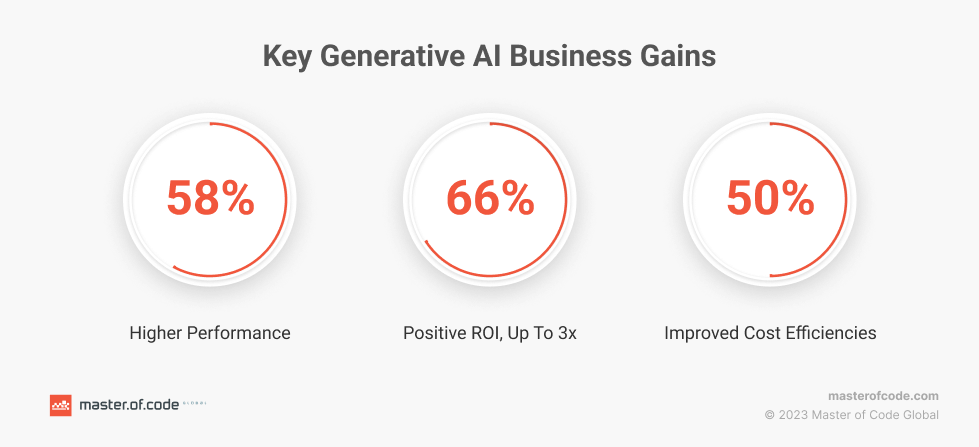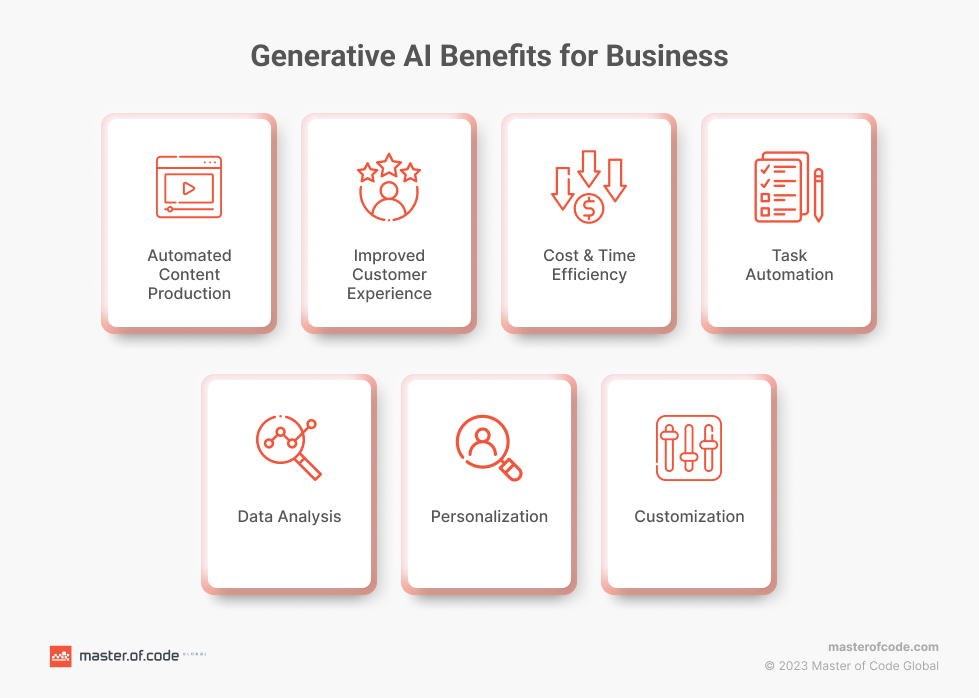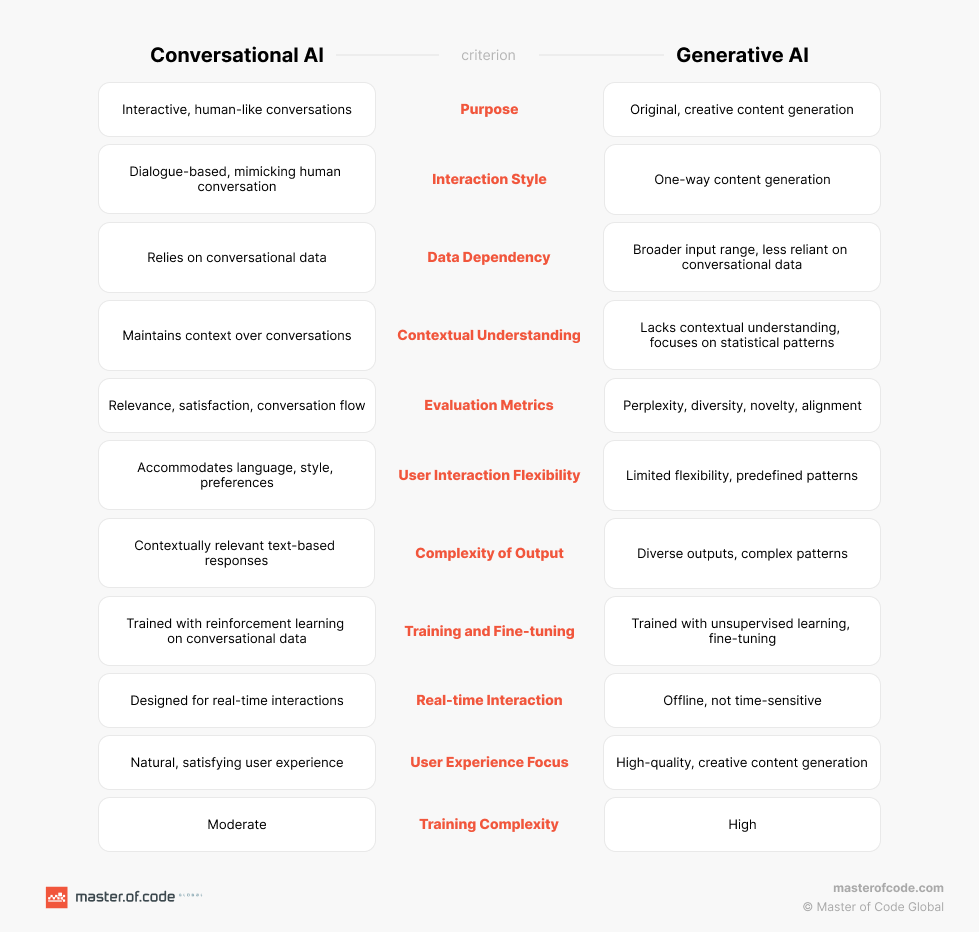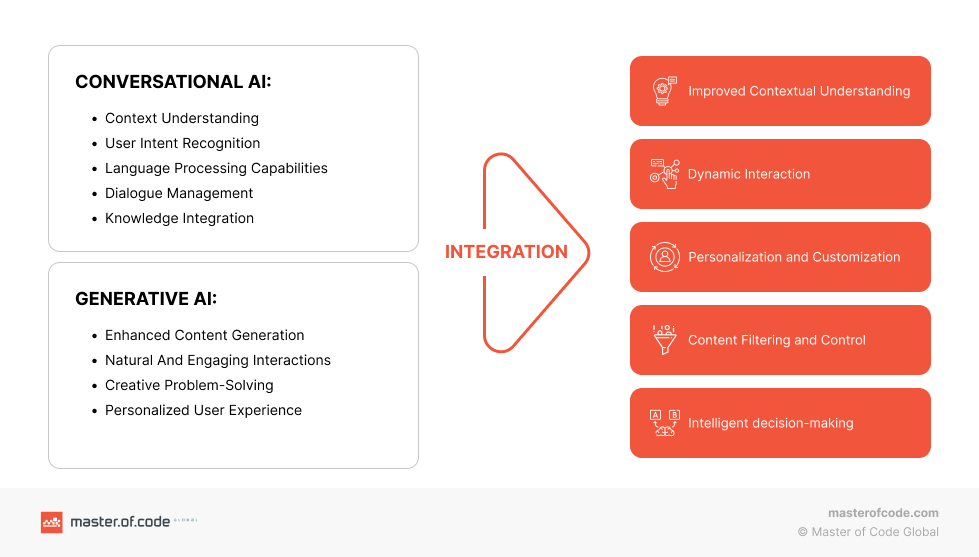As per a recent Gartner poll, 45% of executive leaders have increased their AI investments due to the popularity of ChatGPT. 70% of these executives confirmed that their organizations are currently exploring Generative Artificial Intelligence. But what makes the pros of Generative AI so enticing to these decision-makers?

The statistics provide a compelling answer. For 68% of executives, the benefits of Generative AI far outweigh the associated risks. This belief underlines a growing confidence in its capabilities. Generative Artificial Intelligence investment goals are cost optimization (17%) and enhanced user experience (38%).
The trends don’t end here. The 2024 Global Trends in AI Report by S&P Global reveals that 71% of respondents pushed at least one AI deployment into production. The value derived from AI is undeniable. 70% of organizations cite revenue generation as their primary driver.
Moreover, 67.2% of enterprises plan the adoption of LLMs and Generative AI by year-end. And McKinsey & Company’s report on its economic potential projects astounding figures. The technology could contribute $2.6 trillion to $4.4 trillion annually to the global economy.
75% of value created by AI falls within customer operations, marketing, sales, software engineering, and R&D. Industries like banking, high-tech, and life sciences will benefit from it the most. These numbers underline the transformative role of AI across various sectors. We will explore the benefits of Generative AI for business in detail further in the article.
Table of Contents
Generative AI Overview
According to McKinsey, Generative AI is “a type of AI that can create new data (text, code, images, video) using patterns it has learned by training on extensive (public) data with machine learning (ML) techniques.” What makes it truly remarkable is its versatility.
It can automate, enhance, and expedite a wide range of tasks across various functions. These advantages include classifying data, creating content, summarizing information, and answering questions. In essence, it represents a transformative technology with immense potential for companies.
The Mechanics of Generative AI
Generative Artificial Intelligence is powered by neural networks. It analyzes existing data to discover patterns and generate new content. This technology employs different learning methods during training. These include unsupervised or semi-supervised learning.
Two Generative AI models are generative adversarial networks (GANs) and transformer-based models. Among their strengths, GANs excel in creating visual and multimedia data. Transformer-based models, such as GPT, specialize in generating text. They can understand the context from internet data.
It relies on machine learning algorithms. ML allows the processing of large volumes of data, often collected from the internet. By learning from a lot of training data, it makes content that fits the patterns it has learned.
Generative AI performs best when grounded in structured, multi-source data. Company, employee, jobs, and market signals add critical context that static training sets often miss – enabling outputs that better reflect real-time business conditions”, Laurynas Gružinskas – Head of Product at Coresignal, multi-source B2B data provider
Common Generative AI Tools
Within Generative Artificial Intelligence, various powerful tools have emerged with different purposes. Let’s explore some widely used ones:
- ChatGPT: A large language model chatbot for 24/7 customer service and marketing content generation.
- Google Bard: An experimental AI chatbot. It is designed for research, report generation, educational messages creation, and coding tasks.
- Bing Chat: A conversational AI language model. It focuses on information retrieval, task automation, and content creation.
- Midjourney: An AI-powered text-to-image model creating captivating visuals. It can assist in product design and artistic messaging by using the right Midjourney image generation prompts.
- GitHub Copilot: An AI code assistant enhancing code writing efficiency. It can also reduce errors and aid in learning new programming languages.
- Dall-E 2: An AI model producing realistic images and art from text descriptions. It is ideal for logos, prototypes, and visual elements.
These diverse tools can reshape operations and consumer interactions. As they evolve, use cases promise to further impact innovation and productivity across industries.
Generative AI Benefits for Business
94% of leaders recognize the critical role of AI in the next five years. Generative AI holds immense potential for businesses, and the advantages of Generative AI span productivity, personalization, and more. As per BCG, it increases productivity, personalized customer experiences, and accelerates R&D. Let’s delve into these benefits of implementing Generative AI further.

Automated Content Production
Generative AI is a powerful tool for enterprises seeking to create content efficiently. It can produce articles, marketing materials, and even code, saving both time and resources. For example, the most common use case for marketers (76%) and sales (82%) specialists is basic text pieces creation and copywriting.
Moreover, more than 50% of business leaders have adopted this new technology specifically for content marketing. By automating information generation, companies can maintain a consistent brand voice and style. Their human resources can focus on more strategic endeavors.
Cost Reduction and Time Savings
One of the most significant Generative AI benefits is its ability to reduce operational costs and save time. By automating repetitive tasks, companies can reallocate resources to more critical areas. This allows to increase efficiency and maintain a competitive edge in the market. According to Deloitte, 82% of leaders believe that AI will improve their employees’ performance.
On average, employees utilizing Generative AI save 1.75 hours daily, a full workday each week. 1/3 of survey respondents report saving 30 minutes to an hour daily with Generative AI-based tools. In a survey of financial services professionals, 36% reported reducing annual costs by over 10% (NVIDIA).
Personalized Customer Exoeriences
Generative AI enables enterprises to offer highly personalized experiences to their customers. It powers recommendation engines that suggest products as per individual preferences. This leads to higher sales and clients satisfaction. Additionally, it drives the development of voice assistants enhancing user engagement.
Remarkably, statistics show that 73% of consumers anticipate enhanced personalization. Furthermore, over 75% believe that Generative AI-based applications will elevate their interactions with companies. Additionally, nearly 70% of those who’ve used it are more inclined to buy from companies adopting it.
Increased Productivity
Generative AI’s automation capabilities extend to routine tasks, liberating employees from these responsibilities. Modern AI can automate tasks that currently take up to 60 to 70% of employees’ time.This, in turn, increases overall productivity and allows staff to focus on higher-value activities. As a result, businesses get a more dynamic and innovative workplace. A well-designed recommendation system using AI further amplifies this effect by guiding teams toward the most relevant actions, content, or next-best steps based on data-driven insights.
Data Analysis and Insights
Generative AI excels in data analysis. So it is especially valuable for companies working with large datasets. It can identify trends, patterns, and anomalies. Such data enables data-driven decision-making and a deeper understanding of operations, customer behavior, and market dynamics.
Customization
AI offers the flexibility to train models on a company’s proprietary data. This ensures that the LLM solutions for business align perfectly with the organization’s specific needs and goals. Therefore, it can be used in various industries and applications.
Improved Customer Service
Generative AI plays a crucial role in improving the clients experience. It helps to provide quick, accurate, and personalized responses to inquiries. Such features lead to higher levels of consumer satisfaction and loyalty. This enhanced user experience can translate into increased revenue for enterprises.
In a company with 5,000 customer service agents, employing Generative AI-powered solutions raised issue resolution by 14% per hour. It has also reduced issue-handling time by 9% and cut agent attrition and manager requests by 25%. AI in customer care could boost productivity by 30 to 45% of current function costs.
Generative AI vs Conversational AI: Differences in Application
Conversational AI vs Generative AI: these two differ in several ways. These differences include their purpose, interaction style, evaluation metrics, and other characteristics.

Conversational AI is a cutting-edge technology that enables human-like conversations through dialogue-style interactions. It excels at maintaining conversation context. This ensures relevance, satisfaction, and a seamless flow of dialogue. Its adaptability to language, style, and user preferences makes Conversational AI ideal for real-time interactions. It provides users with a natural and engaging experience.
In contrast, Generative AI focuses on creating original content without direct user input. It operates in a one-way communication style, relying less on conversational data and considering a wide range of inputs. This technology prioritizes metrics like perplexity, diversity, novelty, and alignment. This is needed for the generation of high-quality, creative information. However, its predefined patterns and offline nature limit its suitability for real-time interactions.
Maximizing Business Benefits with Generative AI Integration
Benefits of using Generative AI in business contexts hold significant promise. Yet, there are LLM limitations that make it less than ideal for direct use. These include a lack of domain-specific knowledge, privacy and security concerns, LLM hallucinations, etc. One of the solutions to this problem lies in integrating Generative AI with Conversational AI or other existing applications.

Master of Code Global offers Generative AI integration solutions for your specific needs. Our expert team integrates AI into your chosen platforms and applications. We provide integration with your specific data, knowledge base, and backend systems via API connection. The updated systems will create personalized text pieces, summarize information, and elevate user experiences across your ecosystem. Here are two examples of our projects (more examples are here):
- BloomsyBox Chatbot by Master of Code Global and Infobip, integrated Generative AI and Conversational AI, improving the customer experience. During a Mother’s Day campaign, it achieved a 60% quiz completion rate, with 28% of users winning a bouquet. It introduced personalized greeting cards, and 38% chose LLM to generate messages.
- Generative AI Slack Chatbot streamlines knowledge base navigation in a tech company, used by half the staff. It enhances information access, product understanding, and workflows. This boosts team efficiency and knowledge base use.
In summary, Generative AI has its limitations for direct business use. Integrating it into an existing conversational system can unlock its full potential. At Master of Code Global, we have the expertise and innovative solutions to integrate the new technology. This allows companies to enhance conversational interactions and deliver personalized experiences.
Future of Generative AI in Business
To sum it up, Generative AI benefits can transform the economic landscape, paving the way for an exciting future:
- Accenture estimates as much as 40% of all working hours will be supported or augmented by language-based AI;
- Between 2030 and 2060, 50% of today’s work activities could be automated by Generative AI;
AI is expected to reduce workload by 60% to 70%; - It can also enable labor productivity growth of 0.1 to 0.6 percent annually through 2040;
- By 2026, it’s projected that 30% of outbound marketing messages from large organizations will be AI-generated, up from less than 2% in 2022;
- Generative AI will enable individuals to have their own personalized AI voice assistant in the coming years;
- Generative AI-powered chatbots are expected to reach human-level performance by 2030. It will have a major impact on knowledge work, benefiting marketing and sales functions across all industries.
Potential benefits of Generative AI include enhanced decision-making, increased productivity, and a transformation of knowledge work. The advancement in AI will undoubtedly reshape the business field in ways we can only begin to imagine.
Don’t miss out on the opportunity to see how Generative AI can revolutionize your customer support and boost your company’s efficiency.






